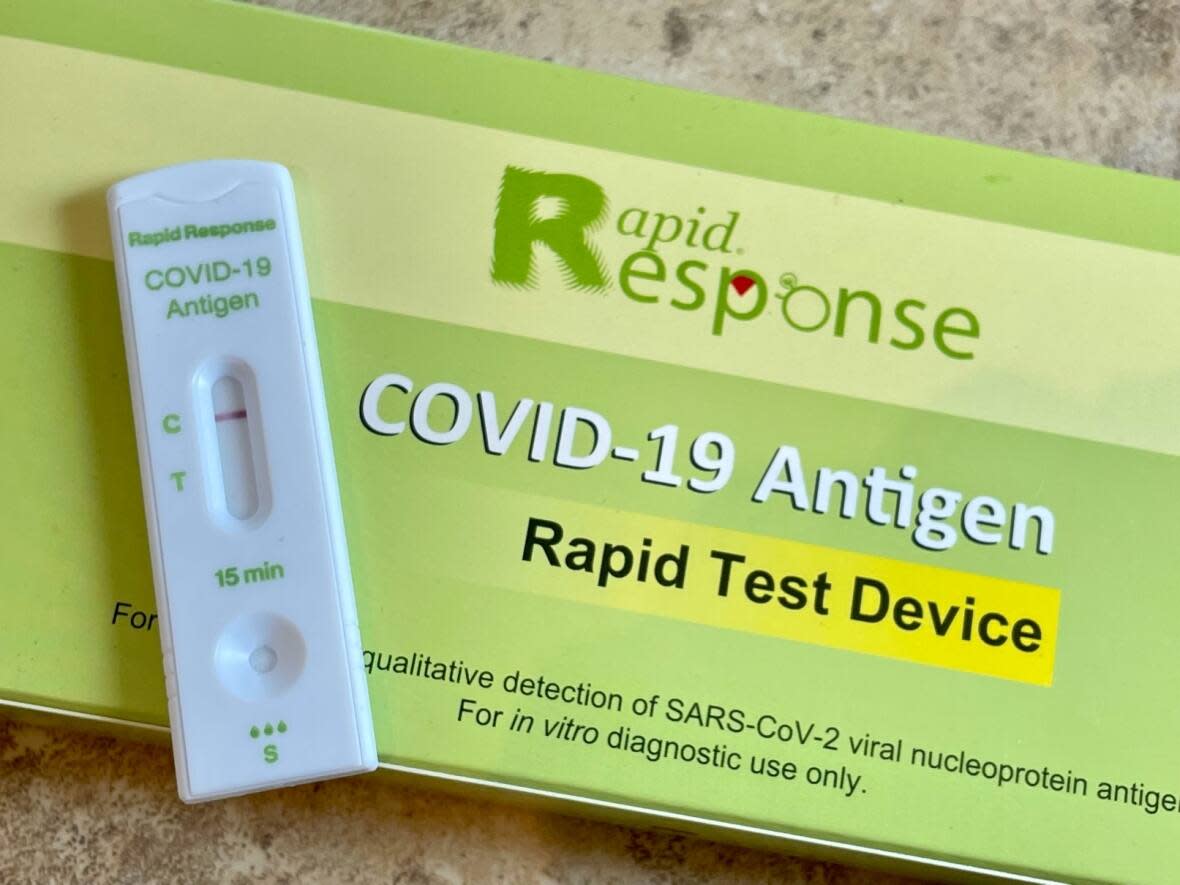N.B. has 'robust' inventory of COVID-19 rapid tests as federal shipments stop

The Department of Health isn't worried about running out of COVID-19 rapid tests, even though the federal government has stopped shipping them to provinces and territories.
"New Brunswick has a robust inventory" of the tests, also known as point-of-care tests, said department spokesperson Sean Hatchard.
He didn't say how many, but the federal government's website shows New Brunswick has an estimated 633,333 tests in stock. That's less than one test per resident.
It's one of the smallest stockpiles in the country. Only Nunavut (509,576), Northwest Territories (369,581) and Yukon (271,873) have fewer tests.
Meanwhile, neighbouring Nova Scotia has more than nine million tests left, Newfoundland and Labrador still has nearly 4.9 million and P.E.I has more than 942,000.
"There is enough inventory for anyone who would like to have tests on hand in case they become symptomatic," Hatchard said.
'Decision made in collaboration'
The federal government has provided more than 680 million free rapid tests to the provinces and territories since the beginning of the pandemic, including 18,455,570 to New Brunswick, the website shows.
The shipments stopped at the end of January — "a decision made in collaboration with all provinces and territories," according to a Health Canada spokesperson.
"Through bilateral engagement, [provinces and territories] informed the federal government they had sufficient supply of rapid tests to fulfill their programming needs," the unidentified spokesperson said in an emailed statement.
Of the more than 811 million tests ordered, at a cost of roughly $5 billion, the federal government has approximately 90 million in inventory, including 50 million allocated to provinces and territories, "which will be held for readiness in case of future need," the spokesperson said.
But there are still "substantial" inventories across the country.
"At this time, New Brunswick isn't anticipating a need to procure additional rapid tests from the federal government," said Hatchard.
Mum on expiry dates
Asked about the earliest expiry dates, he did not respond directly.
"Expiry dates vary by lot. As part of good inventory management process, the first to expire will be the first out," he said.
The federal spokesperson did not provide a direct answer about when the tests are due to expire either, saying provinces and territories are responsible for delivery of their rapid test programs, including management of their inventories.
The spokesperson did note Health Canada has authorized 19 shelf-life extensions for 14 rapid antigen tests for self-testing and point of care use.
Companies establish an estimated shelf life and expiry date based on data they have collected to demonstrate the test will continue to perform as intended and over what period of time, they said.
After Health Canada authorizes a testing device for sale, however, the manufacturer continues to collect data, which is later submitted. "This additional data can sometimes support a longer shelf life than was originally established for the product."
"Health Canada has generally granted shelf life extensions for testing devices following the submission of an authorization amendment by the manufacturer — this amendment has to be supported by the required scientific evidence," according to the spokesperson.
To date, no tests from the federal inventory have been disposed of and the Government of Canada has not repurposed rapid tests, they added.
No symptoms required
Earlier in the pandemic, New Brunswickers had to have COVID symptoms to obtain a rapid test. That changed in the fall.
"As of today, the kits will be available to anyone who wants one," the Department of Health announced on Sept. 21.
To further improve access, the department also expanded the number of distribution sites, particularly in rural areas, to include participating libraries or municipal offices.
"We know that COVID-19 is still circulating in New Brunswick, and that New Brunswickers want to do their best to minimize the spread of the virus within their communities," Dr. Yves Léger, acting deputy chief medical officer of health, said in a statement at the time.
Appointments still necessary
People are still required to schedule an appointment, either online at www.gnb.ca/coronavirus or by calling 1-833-437-1424, to pick up the tests.
Asked whether the province might drop that requirement, Hatchard said booking appointments allows distribution sites to manage pick-up times, the flow of visitors, and the required staff on-site.
"We are continuously evaluating our testing strategies to meet the needs of the current state of the COVID-19 pandemic," he said.
Rapid tests are also distributed to several settings, including long-term care homes, emergency shelters, regional health authority facilities, and First Nations.
The tests continue to be a "useful tool to help guide one's personal and health decision making when symptomatic," Hatchard said.
A positive result can also be used to access the COVID-19 treatment Paxlovid, he said.
The drug is for people with mild to moderate symptoms of COVID-19 that started within the last five days and who are at higher risk of severe outcomes.


